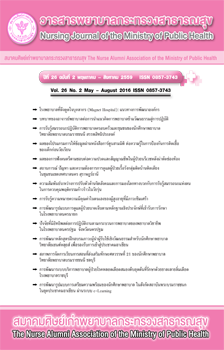การพัฒนาระบบบริการพยาบาลผู้ป่วยโรคหลอดเลือดสมองตีบอุดตันที่รักษา ด้วยยาละลายลิ่มเลือด โรงพยาบาลราชบุรี
Main Article Content
Abstract
บทคัดย่อ
การวิจัยนี้เป็นการวิจัยและพัฒนา มีวัตถุประสงค์เพื่อพัฒนาระบบบริการพยาบาลผู้ป่วยโรคหลอดเลือดสมองตีบอุดตันทีรักษาด้วยยาละลายลิ่มเลือด โรงพยาบาลราชบุรี การวิจัยใช้กรอบแนวคิดทฤษฎีระบบ กลุ่มตัวอย่างเป็นผู้ป่วยโรคหลอดเลือดสมองตีบอุดตันที่ได้รับการรักษาด้วยยาละลายลิ่มเลือดในโรงพยาบาลราชบุรีตั้งแต่เดือนพฤศจิกายน 2554 ถึงมิถุนายน 2559 จำนวน 229 คน กลุ่มตัวอย่างประกอบด้วย 3 กลุ่มคือผู้ป่วยพยาบาล และทีมสหสาขาวิชาชีพใช้วิธีการสุ่มแบบเฉพาะเจาะจง การพัฒนาระบบแบ่งเป็น 3 ระยะคือ วิเคราะห์สถานการณ์ พัฒนาระบบบริการพยาบาลผู้ป่วยโรคหลอดเลือดสมอง และประเมินผลการพัฒนา เก็บข้อมูลโดยใช้แบบสอบถามข้อมูลส่วนบุคคล แบบประเมินระดับความรู้สึกตัว แบบประเมินกิจวัตรประจำวัน แบบประเมินความรู้ของพยาบาลเกี่ยวกับการพยาบาลผู้ป่วยโรคหลอดเลือดสมองตีบอุดตัน แบบประเมินการปฏิบัติของพยาบาลในการดูแลผู้ป่วยผู้ป่วยโรคหลอดเลือดสมองตีบอุดตัน และแบบประเมินความพึงพอใจต่อระบบบริการผู้ป่วยโรคหลอดเลือดสมอง ผลการศึกษาพบว่าหลังการพัฒนาระบบผู้ป่วยมีจำนวนวันนอนลดลง จาก 12.12 วัน ในปี พ.ศ. 2555 เป็น9.83วัน ในปีพ.ศ.2559 ร้อยละของผู้ป่วยที่มีระยะเวลาการมาถึงโรงพยาบาลน้อยกว่า 3-4.5 ชั่วโมงมีจำนวนเพิ่มขึ้น ค่าเฉลี่ยของระดับความรู้สึกตัวของผู้ป่วยและค่าเฉลี่ยของความสามารถในการปฏิบัติกิจวัตรประจำวันของผู้ป่วยก่อนจำหน่ายเพิ่มขึ้น ความรู้ของพยาบาลอยู่ในระดับสูง พยาบาลมีการปฏิบัติตามแนวทางอยู่ในระดับมาก และความพึงพอใจของพยาบาลและทีมสหสาขาวิชาชีพอยู่ในระดับมาก ผลการวิจัยแสดงว่าการพัฒนาระบบบริการพยาบาลช่วยให้ผู้ป่วยได้รับบริการพยาบาลที่มีคุณภาพมากขึ้น ดังนั้นระบบบริการผู้ป่วยโรคหลอดเลือดสมองควรมีการพัฒนาอย่างต่อเนื่อง
คำสำคัญ: โรคหลอดเลือดสมองตีบอุดตัน; ยาละลายลิ่มเลือด; ระบบบริการพยาบาล
* โรงพยาบาลราชบุรี; อีเมล์ติดต่อ : stararat@outlook.com
The development of a nursing service system for patients with ischemic stroke receiving thrombolytic agents in Ratchaburi hospital
Tararat Songsitthikul*
Orawan Anamai*
Abstract
This research and development study aimed at developing a nursing system for patients with ischemic stroke who received thrombolytic agents. The system theory was used as a conceptual framework for this study. The sample was composed of 229 patients with ischemic stroke who received thrombolytic agents and were admitted to Ratchaburi hospital from November, 2012 to June, 2016. The participants of this study also included nurses, and a multidisciplinary team. The system development consisted of 3 phases, including a situation analysis, the development of a nursing system for patients with ischemic stroke, and system evaluation. Data were collected using 6 instruments, including a personal information questionnaire, the Glasgow Coma Score assessment form, the Barthel index assessment form, the knowledge of nurses for caring patients with ischemic stroke questionnaire, the practice of nurses for caring of patients with ischemic stroke questionnaire, and the satisfaction of multidisciplinary team for nursing care system questionnaire. The results show that the length of stay decreased from 12.12 days in 2012 to 9.83 days in 2016. The percentage of patients with onset time going to the hospital less than 4.5 hours increased. Glasgow Coma Score level and Barthel index score before discharge were increased. The knowledge of nurses was at the high level while the practice of nurses for caring of patients with ischemic stroke were at the high level The satisfaction of nurses and the multidisciplinary team was at the high level. The findings indicate that the development of a nursing system for patients with ischemic stroke increases the quality of nursing care. Therefore, a nursing system for patients with ischemic stroke should be continuously developed and applied
Keywords: Ischemic stroke; thrombolytic agents; a nursing system
* Ratchaburi Hospital; e-mail : stararat@outlook.com
Article Details
บทความและรายงานวิจัยในวารสารพยาบาลกระทรวงสาธารณสุข เป็นความคิดเห็นของ ผู้เขียน มิใช่ของคณะผู้จัดทำ และมิใช่ความรับผิดชอบของสมาคมศิษย์เก่าพยาบาลกระทรวงสาธารณสุข ซึ่งสามารถนำไปอ้างอิงได้

